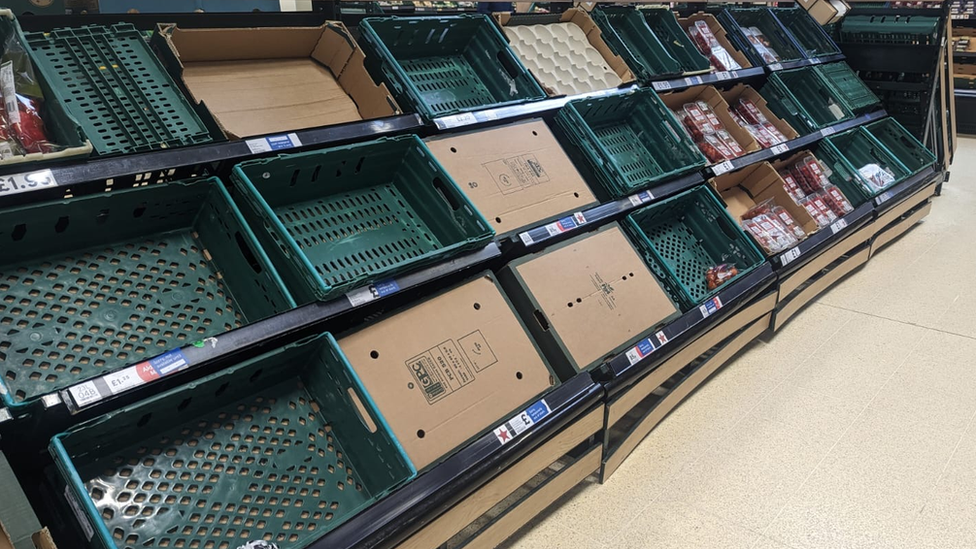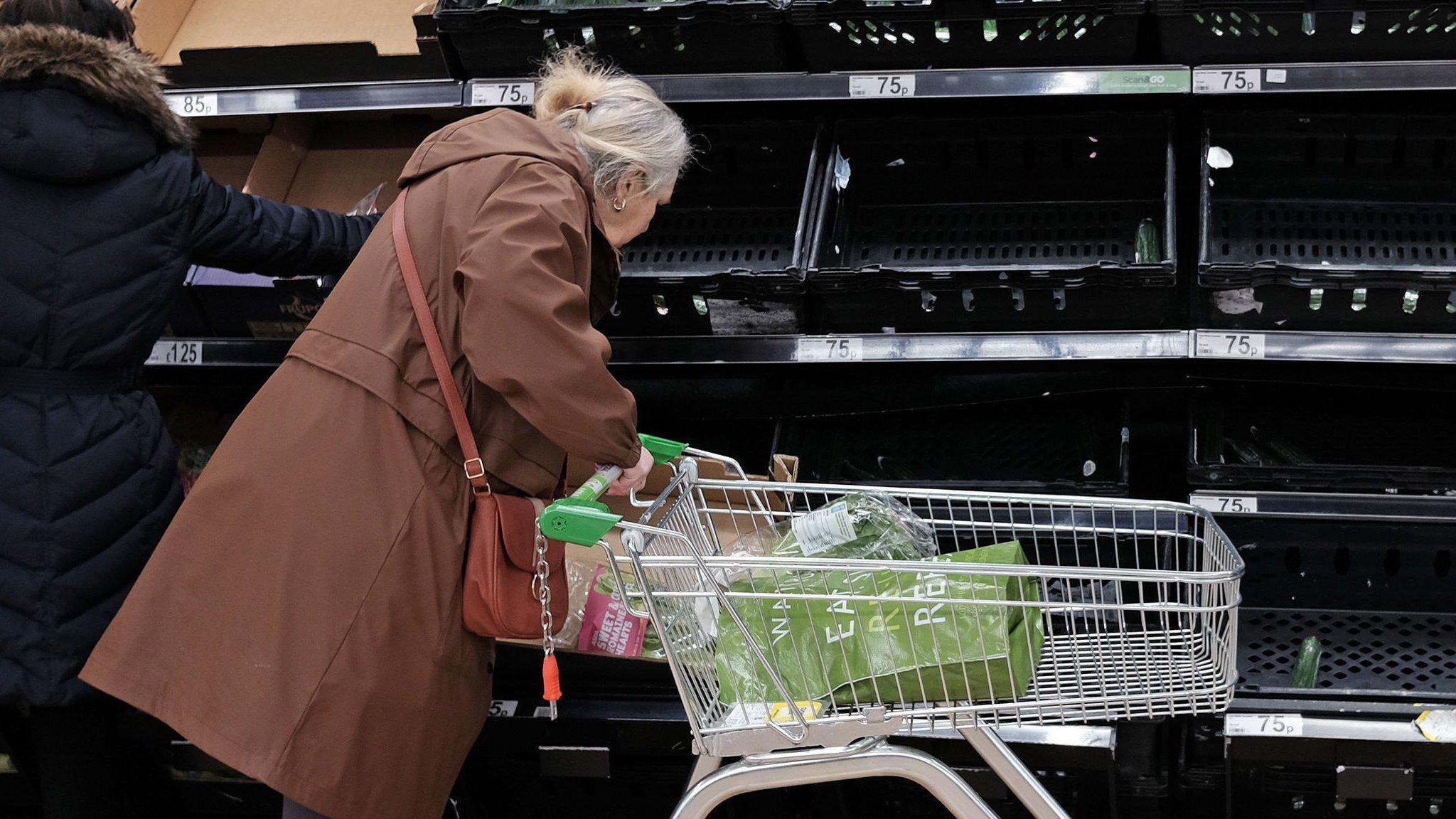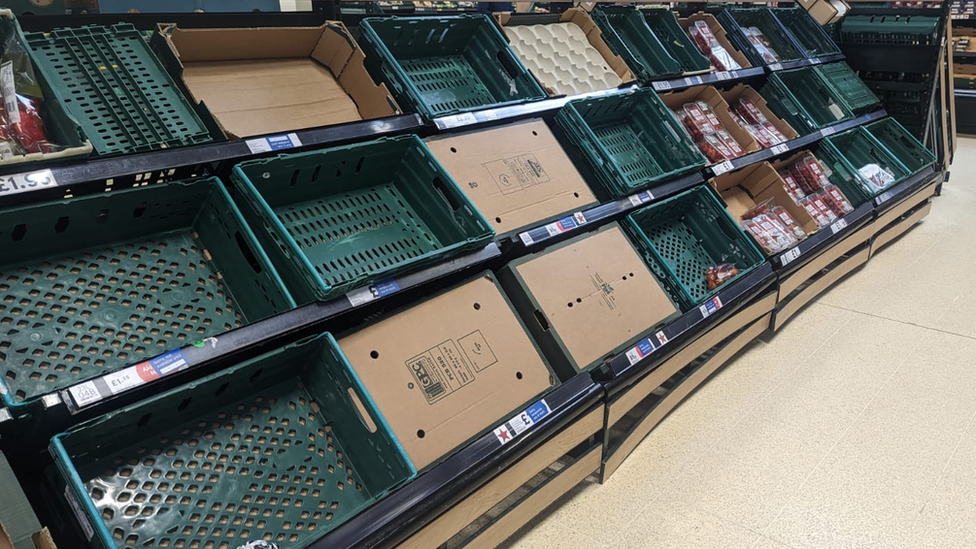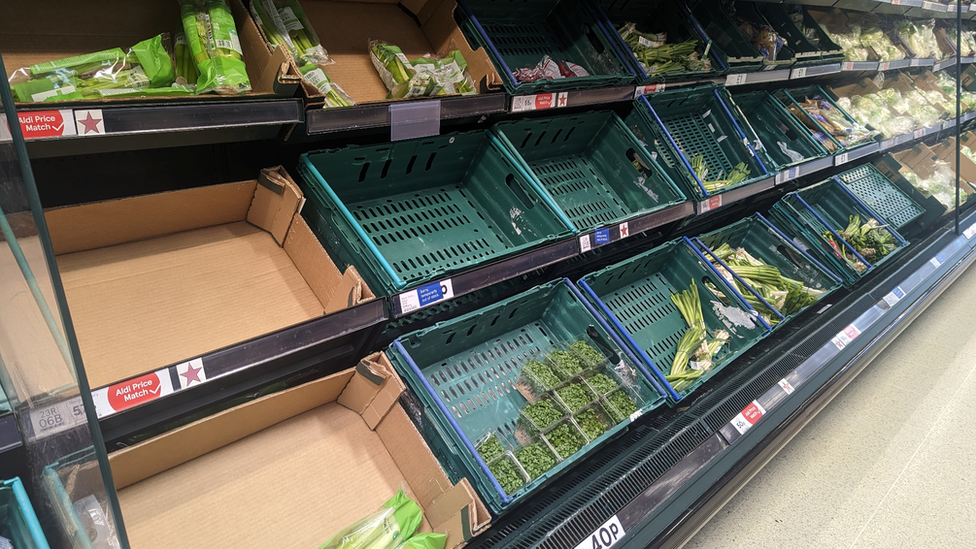Vegetable shortages could last for up to a month
- Published
- comments

Shortages of some fruit and vegetables could last for up to a month, the environment secretary has said.
Therese Coffey's comment came after Asda, Morrisons, Aldi and Tesco placed limits on items such as tomatoes, peppers and cucumbers.
Speaking in the Commons, Ms Coffey told MPs she anticipated "the situation will last about another two to four weeks".
Ministers were talking to retailers about how to avoid such problems in the future, she added.
Shops and suppliers say the shortages have been caused largely by bad weather in southern Europe and Africa.
Responding to an urgent question in the House of Commons, Ms Coffey said: "We anticipate the situation will last about another two to four weeks.
"It is important that we try and make sure that we get alternative sourcing options."
She said the Department for Environment, Food and Rural Affairs (Defra) had already been in discussion with retailers.
"It is why there will be further discussions led by ministers as well, so that we can try and get over this and try and avoid similar situations in the future."
Shadow environment secretary Jim McMahon said: "There is genuine public concern about the availability of food and as the secretary responsible for our food security - and let's bear in mind food security is national security - this is absolutely mission critical."
Ms Coffey added: "I wish to reiterate UK food security does remain resilient."
'Eating turnips'
In the House of Commons session Conservative politician Selaine Saxby said supermarkets were still importing too many products.
She said people "should be eating more seasonally and supporting our own British farms" which would mean "many of these problems would be avoided".
Ms Coffey said it was "important to make sure that we cherish the specialisms that we have in this country - a lot of people would be eating turnips right now rather than thinking necessarily about aspects of lettuce and tomatoes and similar".
But, she added: "I'm conscious that consumers want year round choice and that is what our supermarkets, food producers and growers around the world try to satisfy."

At present, Tesco customers can buy up to three tomatoes, three peppers and three cucumbers in one visit.
Asda has the same restrictions on those products, but has gone further, also putting limits on lettuce, salad bags, broccoli, cauliflower and raspberries. They are also restricted to three purchases of each on one visit.
Aldi has imposed a limit of three per customer on sales of peppers, cucumbers and tomatoes.
In Morrisons, shoppers are restricted to two tomatoes, two cucumbers, two lettuces and two peppers.
Of the remaining supermarkets, the Co-op told the BBC on Thursday there were "no plans to introduce limits on fruit and veg".
Similarly M&S said it had "no plans to introduce limits".
Sainsbury's said it currently had "no purchase limits in place". Likewise Lidl and Waitrose have not brought in any limits.
Brexit effect?
Extreme weather in a number of growing regions in southern Europe and North Africa has been cited as the key reason for the shortages.
In addition, producers in the UK and Northern Europe have been badly hit by high energy costs - because crops are grown in heated greenhouses over the winter. Fertiliser costs have also risen.
However, importers, wholesalers and retailers have played down the idea that Brexit is a factor.
That is partly because the full impact of the Brexit changes have yet to be felt when it comes to fresh produce entering the country from the EU. Customs declarations are required, but border controls are not due to be implemented until 1 January 2024.
Also a significant proportion of the UK's fresh produce comes from Morocco, which is outside the EU. It is subject to border checks, and that has not changed.
But the view from elsewhere in Europe is more nuanced.
Ksenija Simovic is a senior policy adviser at Copa-Cogeca, a group which represents farmers and farming co-operatives in the EU.
She says: "It doesn't help that the UK is out of the EU and Single Market, but I don't think this is the primary reason the UK is having shortages."
In her view, businesses within Europe do benefit both from being closer to where products are grown, and from simpler, better-coordinated supply chains.
Ultimately, she thinks, if there is a shortage of supply then the produce that is available is simply more likely to remain within the Single Market.
In addition, according to some industry experts, the shortages are more evident in the UK than in the EU because European retailers use more flexible contracts, and so can pay more if they need to .
Ms Coffey said: "Our [UK] supermarkets often have a fixed price contract, whereas in other countries there can often be a trend to have a variable price contract."
'Eking out food'
Earlier in the Commons, during an exchange about food banks, Labour MP Rachael Maskell said high demand meant food banks in York were "running out, eking out food supplies".
She asked what the government was doing to "ensure that no-one goes without"?
Ms Coffey said: "We do know that one of the best ways to boost their incomes is not only to get into work if they're not in work already, but potentially to work some more hours, to get upskilled, to get a higher income."
This brought criticism from opposition MPs.
Related topics
- Published23 February 2023

- Published24 February 2023

- Published22 February 2023

- Published21 February 2023
